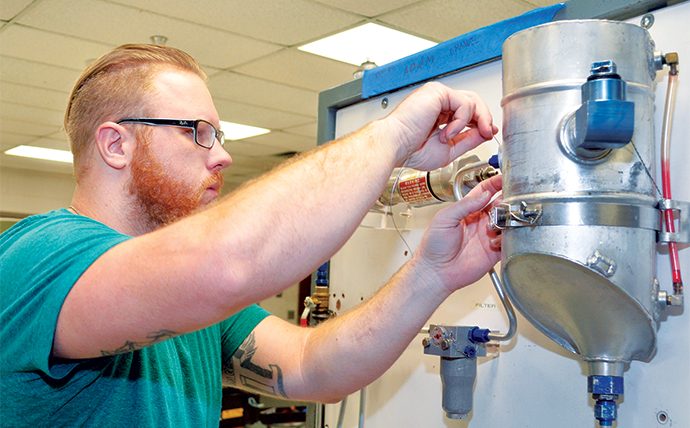At Francis Tuttle Technology Center, the sound of metal fills the shop area of the school as students learn to shape metal sheeting.
With a waiting list of more than 300 students, Francis Tuttle Technology Center in Oklahoma City has offered training for aircraft sheet metal mechanics since 2006. Of the graduates seeking jobs in the industry, more than 93 percent found jobs as aircraft sheet metal mechanics, says Richard Stark, instructor.
“For 288 hours and about $2,200, you can have a career that will always be in demand,” Stark says. “Today, we have 300 people on the waiting list to get into the course, so the demand is high.”
The aerospace industry is a major cornerstone of Oklahoma’s economy and the state serves as a major worldwide center for maintenance, repair and overhaul of aircraft.
According to the Oklahoma Department of Commerce, the industry accounts for more than 120,000 jobs with an average wage well above the state’s. The demand for skilled workers is high, however, and the state’s higher education and technical schools are working to fill the ever-growing need.
Specialized and Focused
Oklahoma’s CareerTech has the ability to respond quickly to the aviation industry’s need to create skilled workers. Specialized training and schools through CareerTech are catering to Oklahoma’s booming aerospace field, and these customized plans include precise training for giants like Tinker Air Force Base to industry-detailed needs at the state’s technical colleges.
mechanics is the way to go.”
Francis Tuttle Technology
CareerTech programs at Francis Tuttle, Mid-Del Technology Center, Gordon Cooper Technology Center and more are offering specialized courses to both high school students and adults to fill the request for skilled aerospace employees.
“Tinker alone is losing 50 to 70 people a month to attrition or retirement,” says Stark. “If you want a career, aerospace and mechanics is the way to go.”
In April 2015, Tulsa Mayor Dewey Bartlett and education officials announced the launch of the Tulsa Tech Aerospace Academy for area high school students, a program that began last fall at the Tulsa Tech Riverside Campus.
The first class had 40 junior and senior high school students and is expected to last at least a full year. Students at the full-day Tulsa Tech program fulfill all state-mandated curriculum while also taking classes in aviation maintenance, network technician training, cyber security and private pilot ground school.
Tulsa Public Schools Superintendent Keith Ballard says the new academy could open up doors for students for advanced degrees or rewarding careers.
“It could lead to higher education,” Ballard says. “It could lead to employment. There are numerous jobs with the aerospace industry in Tulsa, Oklahoma.”
Meeting Military
Several technical schools in the state offer specialized aerospace and maintenance education to fill requested needs at military bases in Oklahoma.
Altus Air Force Base started a “Grow Your Own Mechanic” program in 2013, an aircraft maintenance technician internship program developed in 1999 under the Student Education Employment Plan in cooperation with the Southwest Technology Center’s Aviation and Aerospace program.
Mid-Del Technology Center
The SWTC, located in Altus, provides the initial aircraft technical training courses in airframe and aircraft engine skills to the mechanic candidates. From there, students receive hands-on experience, building aircraft mechanics to help fill positions in maintenance at Altus Air Force Base.
The high school and adult students go through a two-year program to earn their airframe license.
“Most recently, Altus Air Force Base was named the new training base for the KC 46A, the new refueling tanker,” says Jill Owenby, marketing and communications director, SWTC. “Until 1997, all maintenance was done by active duty personnel, but because of costs, civil service contracts were issued. The Director of Maintenance at the base contacted us to provide training for skilled workers.”
Aviation and Avionics Equipment Mechanics and Technicians
According to the Bureau of Labor Statistics:
- 2014 Median Pay — $56,980 per year / $27.40 per hour
- 140,000 aviation mechanics and specialists employed in 2012.
- The projected growth — little to no change through 2022
CareerTech’s FAA-certified aviation maintenance technology programs that provide the FAA Airframe and Powerplant certification exams:
- Southwestern Oklahoma Tech Center in Altus
- Canadian Valley Technology Center in El Reno
- Metro Tech Technology Centers in Oklahoma City
- Gordon Cooper Technology Center in Shawnee
- Tulsa Technology Centers
Mid-Del Technology Center also offers aerospace courses and training at three different facilities. Many of the courses are offered strictly to active duty military and government employees while others are open to high school students and adults.
“At our Tinker Campus, our Business and Industry Services customize courses to fit the needs of the people we are training,” says Mid-Del Technology Center Superintendent Steve Allen. “On base and at the Business Center, we customize training to what Tinker Air Force Base needs.”
The Tinker Technology Center trains military and government employees in the maintenance of aircraft and jet engines, says Jefferson Tarver, TTC director.
“During the course, we can see 7,000 to 10,000 students learning maintenance specific to aircraft,” says Tarver. “We teach everything that has to do with aircraft, including safety, mock out, takeout and more.”
The Business and Industry Services Center provides short term custom training for Tinker Air Force Base and its contractor companies. Classes also include aircraft maintenance and sheet metal courses.
“We are also part of a training program where employees spend two to four weeks training on base, and then they are sent off base to our center to get specialized courses in the basics of jet engines, systems, electrical and sheet metal,” says Allen. “They pretty quickly can advance with this basic understanding of aircraft.”
